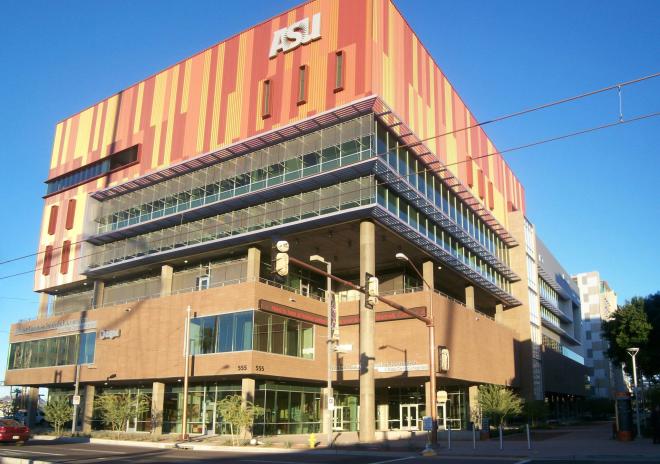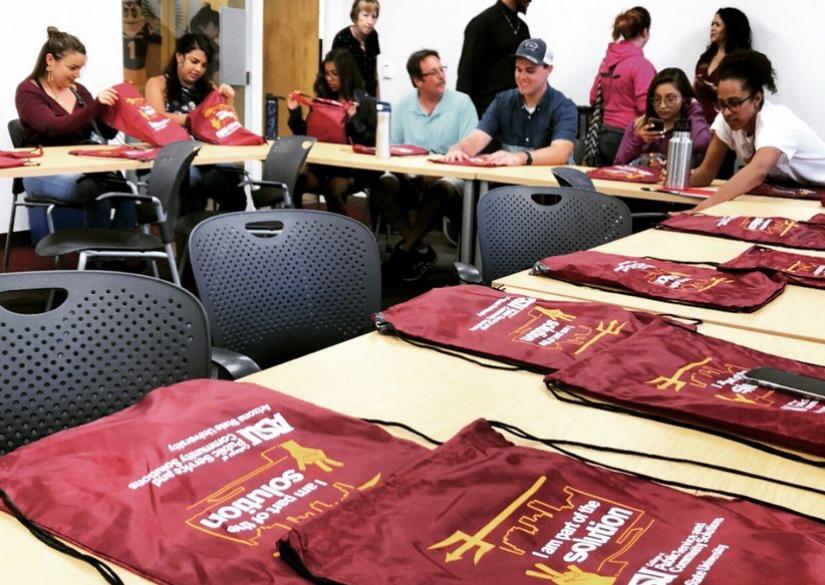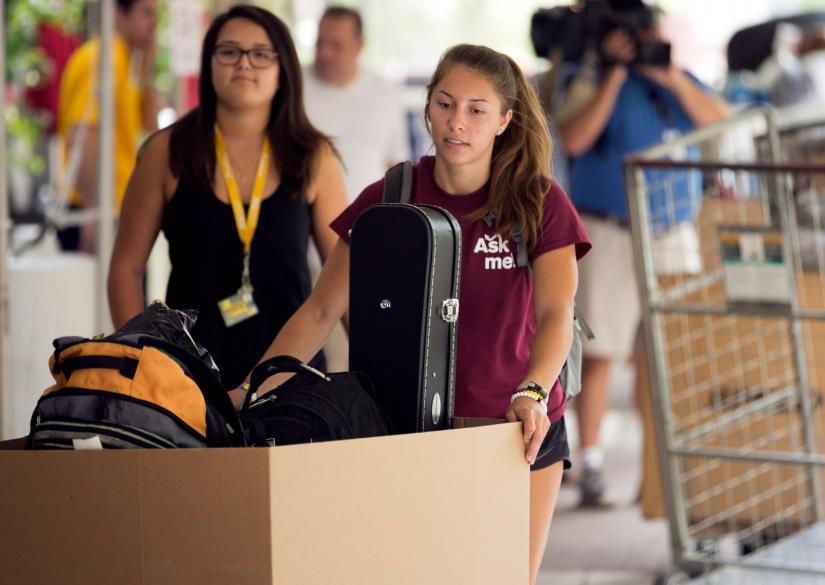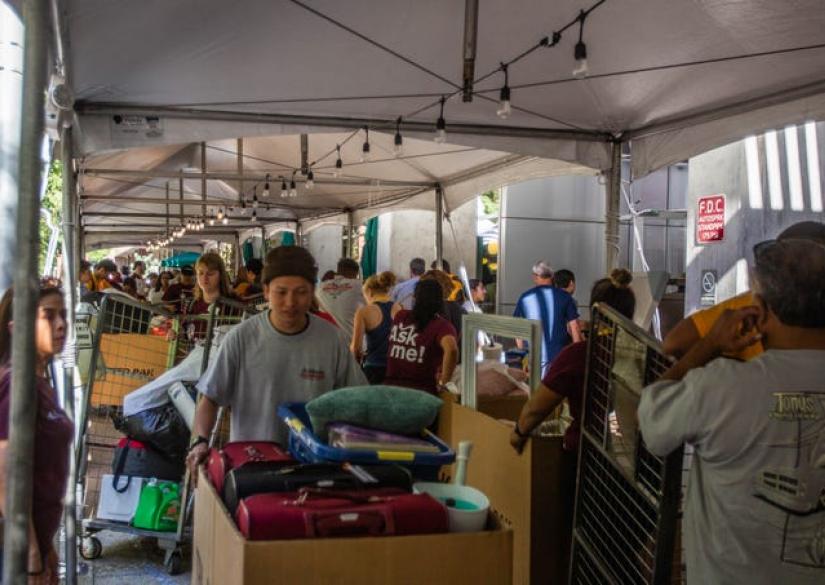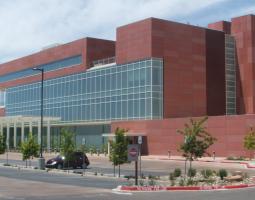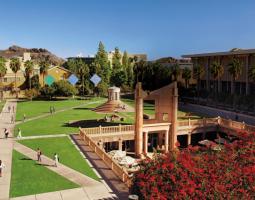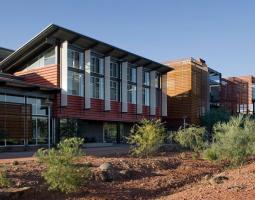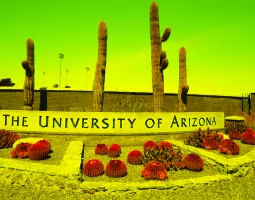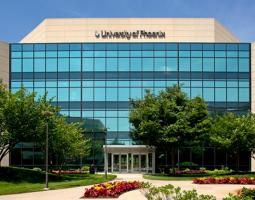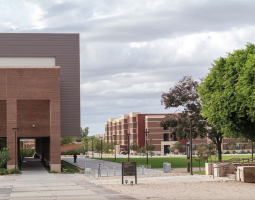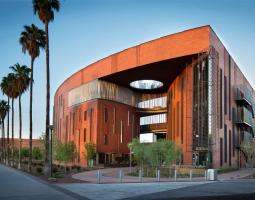Arizona State University (ASU) - Downtown Phoenix Campus
Programs and prices, tuition fees in Arizona State University (ASU) - Downtown Phoenix Campus
Bachelor's Degree
- Age of students — from 18 years old,
- The studying period is three to four years.
The ASU Boston campus offers bachelor's degree programs such as:
- Applied nutrition, health,
- Emergency management,
- Entrepreneurship in the field of healthcare, innovation,
- Medical laboratory science,
- Biomedical Informatics,
- Communication,
- Protection of public interests, social policy,
- Public Sports Management,
- Criminology, criminal justice,
- Dietetics,
- Fashion: technical clothing design,
- Global management,
- Administration, health policy,
- International trade,
- Journalism, mass communications.
Programs lasting 3-4 academic years will provide students with qualified knowledge and professional skills to achieve academic and career success. The course curricula include lectures, participation in practical and research activities, internships, and extracurricular scientific events. Upon completing their studies, students can continue their academic career at the Master's level or find a job in their field of specialization.
Master Degree
- Age of students — from 21 years old,
- The studying period is one to two years.
Master's degree programs are the second stage of higher education, which will provide students with more in—depth knowledge in their chosen field and opportunities to acquire professional skills and qualities through regular practice. On the Phoenix campus, students can earn one of the following degrees:
- Biotechnology, genomics,
- Biosecurity, threat management,
- Sustainability of society,
- Policy, cybersecurity management,
- Internal security,
- Global leadership, strategy,
- Global management: creative industries, design thinking,
- Global Governance: Digital Audience strategy, Global entrepreneurship,
- Leadership, management of non-profit organizations,
- Government policy,
- Sustainable tourism,
- Administration, health policy,
- Personnel and labor law,
- Investigative journalism.
Within one or two academic years, students will acquire competencies that will expand their career opportunities and allow them to take higher positions than after completing their bachelor's degree.
Doctoral Programs
- Age of students – from 23 years old,
- The duration of studying is from three years.
Doctoral degrees will allow students to realize their potential at the highest possible level, eventually taking up the position of a teacher, researcher or supervisor. During 3+ academic years, the student will have to conduct individual research, write a dissertation and submit it to the qualification commission; the entire educational process takes place under the guidance of specialized teachers, personal mentors and researchers of research centers at ASU.
Some of the doctoral degrees at the Phoenix campus are:
- Journalism, mass communications,
- Right
- Law, psychology,
- Innovations in nursing, healthcare,
- Population health,
- Public administration, politics,
- Social work,
- Biostatistics,
- Community Resources, Development,
- Criminology, Criminal Justice.
English Language Program
- Age of students – from 18 years old,
- The studying period is from eight weeks.
Available in face-to-face and online formats, the English Language Program is designed for international learners at basic, intermediate, and advanced levels. All students will study and improve four core competencies: reading, writing, listening, and speaking. Upon reaching certain academic stages, students move to the next level, increasing their chances of successful transfer to higher education programs.
Once a student is accepted into Global Launch, they will take an entrance test to determine at what level they will start learning English. A total of six levels have been developed, each taking eight weeks to complete. Upon completion of the upper level of an English language program with a passing grade of B- (80%) or higher, the student will receive a certificate of completion that will meet the English language requirements for admission to ASU undergraduate/graduate programs.
Description of Arizona State University (ASU) - Downtown Phoenix Campus
- Location: Phoenix, Arizona, USA,
- Year of foundation: 2006,
- Number of students: about 11,000,
- Language of instruction: English,
- Type of studying mixed.
Arizona State University (ASU) Downtown Phoenix Campus is a public research university located in Phoenix, Arizona. It is one of several campuses owned by ASU.
The institution was founded in Tempe in 1885, and only more than 120 years later, in 2006, it settled in Phoenix. The learning area was built in accordance with ASU President Michael M. Crowe's "One University, Many Places" initiative in collaboration with the State of Arizona and local governments. Today, the academic platform provides students with excellent conditions for acquiring knowledge, professional and research skills, and ample opportunities for developing individual abilities, talents, and interests.
The Phoenix campus has about 11,000 undergraduate and graduate students preparing for careers in various fields of healthcare, law, public administration, the arts, and others. Hundreds of specialized programs are being implemented in dozens of faculties and schools to obtain higher education degrees. Under the guidance of experienced, highly qualified teachers, students gain knowledge and skills that meet the requirements of the modern labor market, which quickly leads to a rapid career path. The administrative staff provides comprehensive support, helping to solve many student problems: from obtaining a visa and finding off-campus housing to organizing internships and mentoring.

What factors are considered when evaluating U.S. universities, and how reliable are current rankings?
That's an interesting topic. The criteria used to evaluate universities vary by ranking. For nationwide rankings, factors like class size, teacher salaries, and the number of faculty members with advanced degrees in their field are common considerations. If a ranking focuses on student satisfaction, the criteria will differ. However, rankings don't always align with individual student needs and should be considered alongside other factors.
Educational process
ASU offers hundreds of online degrees and certificates in liberal arts, business, science, nursing, engineering, and more. Thanks to the online platform, which stores hundreds of academic resources, an environment for communication with teachers and classmates has been created, students from different countries can receive a competitive education.
Comprehensive support is provided to all students, both full-time and fully remote. Teachers offer help in learning about difficult topics through tutoring and additional group classes, administrative staff help students adjust the curriculum to their needs and combine study with work. Personal mentors, employees of career and other departments work sensitively to ensure that each student achieves his academic and career goals.
Faculties and colleges
ASU has several specialized colleges that provide the opportunity to study the following areas:
- Design, art,
- A global future,
- Global Management,
- Healthcare Solutions,
- Journalism, mass communications,
- Jurisprudence
- Nursing, Healthcare,
- Public service, public decisions.
Scientific achievements
ASU has been actively engaged in research activities for many years: thanks to the discoveries, innovations and design work of its researchers, many social changes have been introduced that have affected the life of not only the local, but also the international community. Some of the projects of recent years:
- The SpaceX Falcon Heavy rocket carrying the Psyche spacecraft launched from NASA's Kennedy Space Center on October 13, 2023. The ASU-led Psyche mission includes a six-year, 2.2-billion-mile journey to encounter the asteroid Psyche. This metal-rich asteroid is a type that has never been explored before,
- The Bermuda Atlantic Time-series Study (BATS), conducted by ASU's Bermuda Institute of Oceanology, tracks critical long-term ocean trends. BATS is installing a large volume seawater pump in the Sargasso Sea, which has seen an increase in surface temperature, acidity and salinity over the past 40 years.
- Research student Christina Bell and mechanical engineer Juan Vela test the connections of microwave energy guides inside a metal room in the Biodesign Building. The floor, walls and ceiling of the room, called the Faraday cage, are made of aluminum, which shields the sensitive signals used to amplify the power for the linear accelerator, which is part of the compact X-ray free-electron laser ASU.
- Violinist Seth Thorne, a faculty member in the School of Arts, Media, and Engineering, has patented a violin shoulder rest that uses haptic feedback to serve as a silent metronome, helping people with hearing impairments adjust to rhythm.
Accommodation, meals, prices
First-year students of all majors are accommodated in the comfortable Gordon Commons residence located in the center of the campus. The residential building is adjacent to the Walter Cronkite School of Journalism and Mass Communication, University and Student Centers, and is within walking distance of many restaurants, sporting events, and shopping areas.
Students are accommodated in double rooms with fully furnished bathrooms. Among the common areas are:
- Fitness center in the lobby on the second floor,
- Shared kitchen with all necessary appliances for cooking and storing food, located on the ground floor,
- Laundry rooms on each floor,
- Self-study classrooms,
- Conference rooms,
- Terrace, 4,000 sq ft Shade Garden,
- Gordon Commons Residential Restaurant,
- Starbucks,
- Chick-fil-A and Panda Express.
Senior students live in Fusion on First, a 16-storey complex with an area of 283,000 square meters. The living quarters are located on 13 floors and offer apartment-style accommodation, including two to four separate bedrooms, two bathrooms and a kitchen and dining area shared by the residents. There are a limited number of single studios with a full range of amenities. There are laundries on each residential floor.
Students are encouraged to choose a meal plan that suits their needs. Meal plans represent a certain number of meals in restaurants and cafeterias at the university + additional points for purchases at ASU stores. Students can create a plan with full meals for the semester or book, for example, only snacks.
Activities Arizona State University (ASU) - Downtown Phoenix Campus
ASU students actively participate in the extracurricular activities of the university, being members of national sports teams, creative teams, student clubs, and social groups. The infrastructure and its partnerships with a number of national organizations allow students to realize their potential at a fairly high level, competing and performing at leading venues in the city and state.
There are many competitions in intra-university sports throughout the year. To win, national teams and solo athletes attend weekly training sessions in indoor halls, swimming pools, and outdoor areas. Some of the sought-after sports are:
- Volleyball,
- Badminton,
- Hockey,
- Football,
- Frisbee,
- Basketball,
- Table tennis,
- Softball,
- Water polo.
Themed clubs based on the interests and hobbies of students are an important part of student life — groups participate in various events both on and off campus, regularly hold meetings and workshops.:
- Active leisure,
- Association of Azerbaijani Students,
- Dancing,
- Modern philosophy,
- Advertising production,
- Artificial intelligence,
- Music,
- Amateur radio,
- American Sign Language,
- Anime,
- Arab culture and others.
Advantages
- A university with a long history and traditions,
- Being in international, national rankings of leading higher education institutions, including US News & World Report, The Wall Street Journal, Money Journal, Princeton Review,
- Active research activities assessed at the R1 level,
- A wide variety of extracurricular areas for the development of sports, creative talents,
- Exceptional conditions for learning, including modern facilities, sports infrastructure,
- The teaching staff includes Pulitzer Prize winners, Nobel Prize winners, and members of the National Academy of Sciences.
Facilities and equipment at Arizona State University (ASU) - Downtown Phoenix Campus
The ASU Downtown Phoenix Campus is located in the center of Phoenix, adjacent to many scientific, commercial organizations, restaurants, entertainment centers and attractions. The city has excellent transportation facilities, so students can immerse themselves in learning about the culture and customs of the locals or go on a weekend trip around the state.
The campus infrastructure represents a modern approach to teaching theoretical knowledge and practical skills — all rooms have interactive equipment, and specialized laboratories are equipped with innovative technologies for carrying out design and research work. The university, located in Phoenix, has about 10 faculties, for each of which specialized classes have been created: laboratories, workshops, computer rooms. Lectures in all areas are held in modern classrooms and research centers located in several buildings.
There are also student recreation areas on the campus, several restaurants and dining halls, and outdoor areas for walking. In their free time, students can use the services of the fitness center, which has gyms, yoga and dance studios, and a swimming pool.
Admission dates and extra charges
The academic year consists of three semesters:
- Autumn: September-December,
- Spring: January-May,
- Summer: May-September.
Depending on the chosen program, the date of admission, the number of semesters will vary. Between semesters, there are sessions lasting 7.5 weeks, seasonal holidays. Holidays are also organized on weekends, national and international holidays.
Approximate list of additional costs:
- Registration fee, deposit,
- Accommodation, meals,
- Books, consumables, personal specialized equipment,
- Additional academic opportunities not provided for in the curriculum,
- Some extracurricular activities,
- External exams,
- Compulsory insurance,
- Personal expenses.
Enrolment process
Applicants need to go through several entrance stages, most of which are available online:
- Filling out the online application form, providing the required documents,
- Payment of the registration fee,
- Passing an interview, possible tests,
- Receiving an official invitation to enroll,
- Making a deposit to book a place on the course,
- Arrive on campus to start classes.
Perspectives
Upon completion of higher education programs, university graduates always have the opportunity to continue their academic path at the next stage of the university system.
ASU graduates are ready to succeed both personally and professionally, they are versatile learners who thrive through innovative thinking and interdisciplinary approaches to problems and solutions.
Entry requirements, how to apply, what is required to enrol
International applicants wishing to enroll in one of the higher education programs at ASU must provide:
- Personal documents: valid passport, visa or residence permit, health insurance,
- Academic certificates from the previous place of study: certificate of complete secondary education and certificate of preparatory course / bachelor's diploma in a related specialty / master's diploma in a related field, scorecards,
- IELTS, TOEFL, PTE Academic or any other language test recognized by the university – English language proficiency level must be at least B2,
- A CV describing individual achievements, goals and ambitions for further education.
Some programs may require letters of recommendation, work experience.
Scholarships Arizona State University (ASU) - Downtown Phoenix Campus
Most students are eligible for financial aid, regardless of their household income. Federal financial assistance may include:
- Pell Grants,
- Scholarships
- Credits
- Work-study program.
Some of the scholarship programs awarded by ASU are:
- The New American University Merit-Based Scholarship is awarded to a limited number of qualified international undergraduate students who demonstrate high academic achievement,
- Scholarships of internal faculties based on academic merit,
- Private scholarships awarded by partner organizations, foundations.
Literature and references
-
Arizona State University Downtown Phoenix campus — Wiki
-
Arizona State University-Downtown Phoenix — Data USA
-
Arizona State University — Downtown Phoenix — U.S. News & World Report
-
Arizona State University (Downtown Phoenix) — Times Higher Education
-
Arizona State University : Rankings, Fees & Courses Details — Top Universities
-
Arizona State University rises in ranks of research spending — Phoenix Business Journal
Institution on the map
Residence permits, citizenship and other services
- Guardianship services during the studies
- Student supervision
Review about Arizona State University (ASU) - Downtown Phoenix Campus
Recommendations on when to apply
| Language courses, schools and children's language camps | Primary and secondary education - private schools | Preparation programmes for entering universities - higher education | Higher education (after completing accredited programs A-level, IB, High School) - Bachelor, Master, MBA |
| - we recommend to apply 6-9 months before the start of the course (some camps and schools offer discounts for early booking or for lengthy study programs) - there are some very popular and high demand children's camps, where the applications need to be submitted 1 year in advance (in particular Switzerland , Great Britain , USA , Canada , Austria) | - we recommend to apply one year before the start of the training program, - some schools have a specific time frame (September-November - please specify an individual school) - some schools require tests in several stages (UKISET, internal tests of the school: English, mathematics, logics, subjects, interview, some require a personal visit) | - we recommend to apply one year before the start of the program, - for Foundation and Pathway programs, IELTS and TOEFL certificates are usually required, respectively | - recommended submission one year before the start of the program, - the deadline normally closes in January, for TOP HEIs and, as a rule, in March in other universities - for a bachelor, a Foundation or Pathway preparatory program a completed A-level, IB, High School + IELTS / TOEFL are required - for Masters you need a graduated higher education, in some cases you need a pre-Masters program - MBA requires completed higher education, work experience preferably at least 2-3 years, etc. |


